You are here
New Releases

UNFPA Regional Situation Report for the Syria Crisis — August 2020
The Regional Situation Report for the Syria Crisis offers a bird’s eye view of UNFPA’s operations within the context of the Syria Crisis. The report is prepared by the UNFPA Regional Syria Response Hub in Amman, Jordan, and spans operations conducted by UNFPA offices in Syria, Jordan, Lebanon, Turkey, Iraq, and Egypt, in addition to operations conducted inside Syria and managed from cross-border Turkey.
In addition to providing aggregated quantitative results for each country, the report also brings stories from the field that highlight the plight of communities inside Syria and in host countries, in addition to underscoring the positive impact of the response services provided by UNFPA in the areas of sexual and reproductive health, gender-based violence, youth, and others. As of February 2020, the report also covers UNFPA’s efforts to ensure continuity of operations throughout the Syria crisis region during the COVID-19 pandemic.


Implementation Manual for Developing a National Network of Maternity Units
Improving Emergency Obstetric And Newborn Care (EmONC)
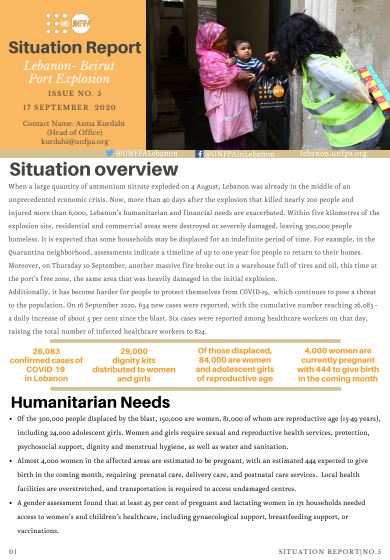
Beirut Explosion Situation Report No.5
When a large quantity of ammonium nitrate exploded on 4 August, Lebanon was already in the middle of an unprecedented economic crisis. Now, more than 40 days after the explosion that killed nearly 200 people and injured more than 6,000, Lebanon’s humanitarian and financial needs are exacerbated. Within five kilometres of the explosion site, residential and commercial areas were destroyed or severely damaged, leaving 300,000 people homeless. It is expected that some households may be displaced for an indefinite period of time. For example, in the Quarantina neighborhood, assessments indicate a timeline of up to one year for people to return to their homes. Moreover, on Thursday 10 September, another massive fire broke out in a warehouse full of tires and oil, this time at the port’s free zone, the same area that was heavily damaged in the initial explosion.
Additionally, it has become harder for people to protect themselves from COVID-19, which continues to pose a threat to the population. On 16 September 2020, 634 new cases were reported, with the cumulative number reaching 26,083 - a daily increase of about 5 per cent since the blast. Six cases were reported among healthcare workers on that day, raising the total number of infected healthcare workers to 824.
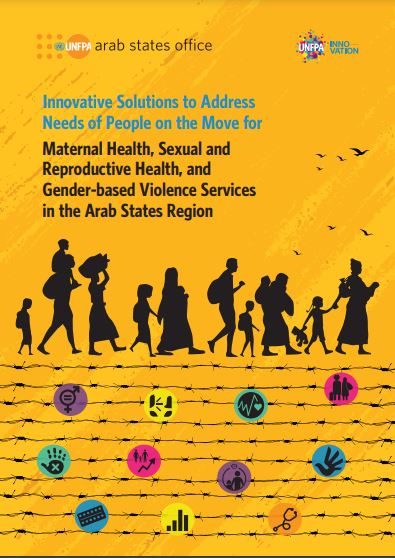
Innovative Solutions to Address Needs of People on the Move for Maternal Health, Sexual and Reproductive Health, and Gender-based Violence Services in the Arab States Region
Mixed migration in the Arab States region is a complex multidimensional phenomenon as the region hosts a combined 34% of the world’s population of the forcibly displaced1 who need access to protection and basic social services including maternal health (MH), sexual and reproductive health (SRH) and gender-based violence (GBV) information and services. Since access to protection and other types of services can be challenging, not the least due to the often precarious legal status of the concerned population groups, the role that innovation can play across the humanitarian sector is noteworthy. Innovation is as a matter of fact, attracting considerable attention, with its potential to open up new ways to meet the various needs of “people on the move”.
In order to find out more information about the real-time needs of “people on the move” in the region, with specific attention to maternal health, sexual and reproductive health and gender-based violence needs, the UNFPA Arab States Regional Office (ASRO) has commissioned this two-parts report which consists of:
(a) a mapping/needs assessment in the form of a desk review, to more precisely gauge what those needs might be at various points journey of “people on the move”; and
(b) a horizon scan for potential or existing innovative solutions that UNFPA or others might have in the pipeline, or already in place, to address identified target group needs. Part One of this report presents the results of the desk review that aims to identify sexual and reproductive health, maternal health and GBV needs among “people on the move” in Egypt, Iraq, Jordan, Lebanon, Morocco and Sudan, with a focus on youth and women of reproductive age. Part Two identifies and highlights existing innovative practices that might promote the health of “people on the move”. Drawing on the horizon scan findings, the report concluded with recommendations to the international development community on the need to partner on already proven solutions that would address the MH, SRH and GBV needs of “people on the move” but also considers the design and implementation of new potential solutions.
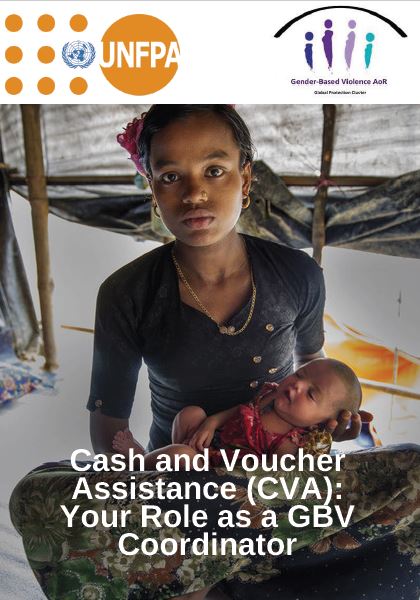
Cash and Voucher Assistance (CVA): Your Role as a GBV Coordinator
Cash and Voucher Assistance (CVA) can support access to GBV and other sexual and reproductive health services, and contribute to the safety, dignity and resilience of women and girls in humanitarian contexts. It can offer discretion and flexibility compared to in-kind assistance, which can be particularly helpful for those who may be more at risk of GBV and loss of income due to their personal characteristics, such as older women, adolescent girls, persons with disabilities and LGBTIQ persons. CVA can also strengthen protection outcomes for women and girls: women at risk who can use CVA for housing or other basic needs are less likely to resort to transactional sex or harmful practices such as forced marriage, and may be less vulnerable to sexual exploitation and abuse.
CVA can cover the immediate, lifesaving needs of survivors such as emergency medical treatment and transport costs for clinical management of rape (CMR) services as part of a safe and confidential Case Management process to support healing and recovery.
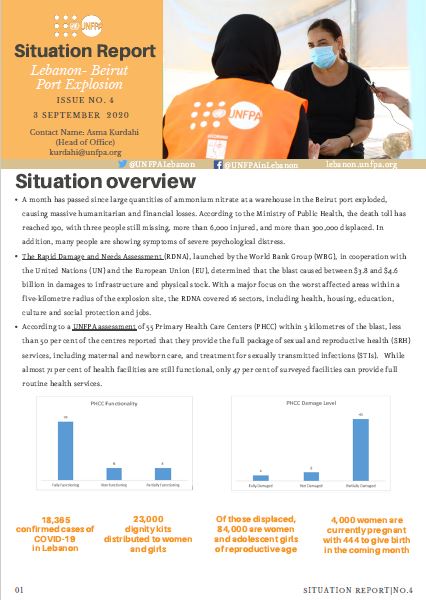
Beirut Explosion Situation Report No.4
A month has passed since large quantities of ammonium nitrate at a warehouse in the Beirut port exploded, causing massive humanitarian and financial losses. According to the Ministry of Public Health, the death toll has reached 190, with three people still missing, more than 6,000 injured, and more than 300,000 displaced. In addition, many people are showing symptoms of severe psychological distress.
The Rapid Damage and Needs Assessment (RDNA), launched by the World Bank Group (WBG), in cooperation with the United Nations (UN) and the European Union (EU), determined that the blast caused between $3.8 and $4.6 billion in damages to infrastructure and physical stock. With a major focus on the worst affected areas within a five-kilometre radius of the explosion site, the RDNA covered 16 sectors, including health, housing, education, culture and social protection and jobs.
According to a UNFPA assessment of 55 Primary Health Care Centers (PHCC) within 5 kilometres of the blast, less than 50 per cent of the centres reported that they provide the full package of sexual and reproductive health (SRH) services, including maternal and newborn care, and treatment for sexually transmitted infections (STIs). While almost 71 per cent of health facilities are still functional, only 47 per cent of surveyed facilities can provide full routine health services.

Empowering Girls and Women to Lead Change Annual Report 2019 17 1 0
UNFPA-UNICEF Joint Programme on the Elimination of Female Genital Mutilation: Accelerating Change
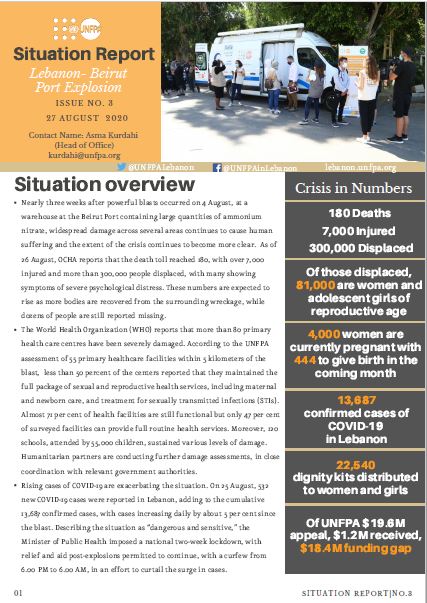
Beirut Explosion Situation Report No.3
Nearly two weeks after powerful blasts occurred on 4 August, at a warehouse at the Beirut Port containing large quantities of ammonium nitrate, widespread damage across several areas continues to cause human suffering and the extent of the crisis continues to become more clear. As of 26 August, OCHA reports that the death toll reached 180, with over 7,000 injured and more than 300,000 people displaced, with many showing symptoms of severe psychological distress. These numbers are expected to rise as more bodies are recovered from the surrounding wreckage, while dozens of people are still reported missing.
The World Health Organization (WHO) reports that more than 80 primary health care centres have been severely damaged. According to the UNFPA assessment of 55 primary healthcare facilities within 5 kilometers of the blast, less than 50 percent of the centers reported that they maintained the full package of sexual and reproductive health services, including maternal and newborn care, and treatment for sexually transmitted infections (STIs). Almost 71 per cent of health facilities are still functional but only 47 per cent of surveyed facilities can provide full routine health services. Moreover, 120 schools, attended by 55,000 children, sustained various levels of damage. Humanitarian partners are conducting further damage assessments, in close coordination with relevant government authorities.
Rising cases of COVID-19 are exacerbating the situation. On 25 August, 532 new COVID-19 cases were reported in Lebanon, adding to the cumulative 13,687 confirmed cases, with cases increasing daily by about 5 per cent since the blast. Describing the situation as “dangerous and sensitive,” the Minister of Public Health imposed a national two-week lockdown, with relief and aid post-explosions permitted to continue, with a curfew from 6.00 PM to 6.00 AM, in an effort to curtail the surge in cases.
The Beirut Port, which usually processes up to 90 per cent of Lebanon’s imports, is only partially operational. Between 11 and 18 August, 21 freighters and six international ships docked in the port and provided essential items including food. This reduced the aggravation of food insecurity, which was growing amid the COVID-19 pandemic and the prolonged socio-economic crisis.
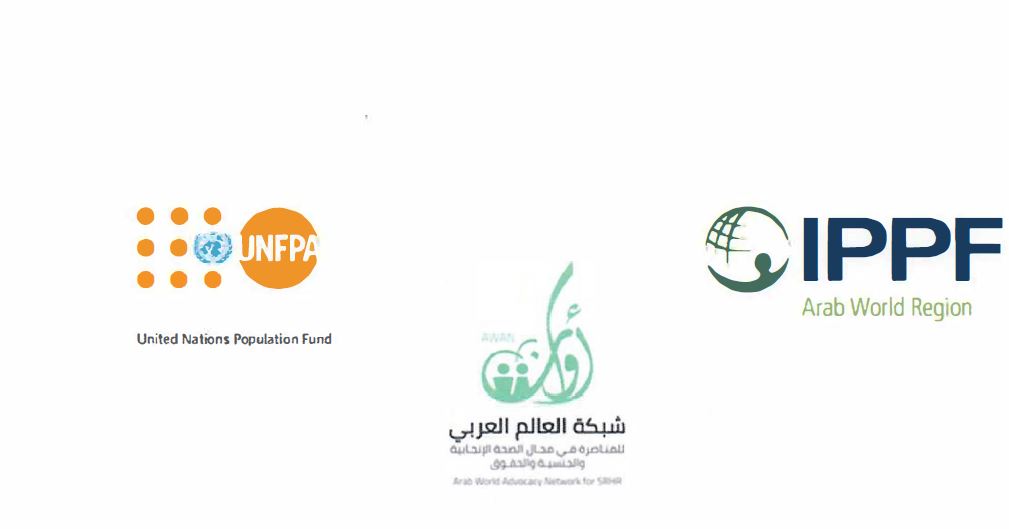
Regional Actors call all to address the negative impact of the Covid-19 pandemic on sexual and reproductive health and reproductive rights
Cairo - 26 August 2020 - UNFPA, IPPF AWR and the other members of the Arab World Advocacy Network (AWAN) for Sexual and Reproductive Health and Reproductive Rights noted that integrating sexual and reproductive health and reproductive rights into their Covid-19 response and recovery so far have fallen short and stress that it is now more important than ever before to realize women’s and girls’ choices and rights to sexual and reproductive health and reproductive rights.
AWAN is the Arab World Advocacy Network for Sexual & Reproductive Health and Reproductive Rights (SRH & RR) co-founded by UNFPA Arab States Regional Office and IPPF Arab World Region with the membership of several organizations that share the same objectives in terms of advocating for women, girls’ and young persons’ SRH needs and RR.
AWAN acknowledges the unprecedented challenge that Covid-19 poses and stand in solidarity with women and girls who are disproportionately affected by the pandemic. Women account for 70% of health workers, and they perform nearly five times as much unpaid care work as men, putting them at a greater risk for contracting the virus.
AWAN reiterates that it is critical that Arab governments ensure the continuity of essential sexual and reproductive health services, respecting the reproductive rights of women and girls and their right to bodily integrity and autonomy.
More in the attached document.